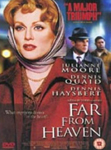

 |
Far
From Heaven
|
 |
|
Cerisaye's Review Kathleen Wittaker has a perfect life:† successful executive husband, two sweet children, lovely home and busy social calendar.† Set in 1950s Hartford, Connecticut, the film recreates the feel of movies from that era, with hyper-real colour and lush orchestral score.† It looks beautiful in every detail, from locations to sets to costumes.† Yet, like the decade it evokes, all is not as it seems.† We see Kathy called out to the local police station to bail her husband Frank for something he describes as a silly mistake.† His secret isnít hard to guess, when Frank ignores a hooker and looks longingly at other men.† You really feel the risk men took to satisfy that hunger.† Frank visits a gay bar where he has to show ID, and fearfully goes cruising.† When Kathy disturbs her husband at his office in a passionate embrace with another man, her world comes falling down, revealed for the sham it is. Frank is a devoted family man.† In desperation he seeks medical intervention to cure his Ďconditioní.† Just goes to show how little things had changed since the Edwardian era of Maurice.† Itís disturbing to hear electric shock treatment, psychiatric therapy and drugs suggested as possible Ďcuresí for homosexuality.† Dennis Quaid gives a convincing performance as a man trying hard to overcome desire and falling apart in the process because itís not what he really wants deep down.† He takes to drink to numb the pain, meanwhile his wife chats gaily about hors díoeuvres for their annual party.† Then Frankís self-hatred turns violent. What makes this movie interesting is that we see everything exclusively from Kathyís POV, including Frankís coming out. Kathy is buttoned-up 50s repression personified.† When she turns to handsome black gardener Raymond and they become friends the film takes off, running parallel stories of illicit love, same-sex and inter-racial, that couldnít have been told in its era.† Skin colour canít be hidden like gayness, and, like Maurice and Scudders crossing the class divide, her burgeoning relationship with Raymond shocks contemporaries even more than revelation of Frankís sexuality.† Examples of everyday racism shock modern sensibilities, for example seeing parents hauling children out of a pool because a small black child canít resist taking a dip. Frank is more free to follow his desire than his wife and Raymond to explore their feelings.† At a resort in Miami Frank spots a blond boy, who knowingly returns his look of recognition.† Itís clear they have sex off camera.† Kathy and Raymond at the train station toward the end can only look at each other; the one time they touch publicly a passer-by yells at Raymond to get his hands off.† Fellow black people are no more tolerant of a mixed relationship than white bigots.† A white woman and a black man canít be together, whereas Frank and his boy lover can pass for Ďnormalí.† People believe what they want to.† Sadly Kathyís emotional awakening through the character of Raymond, doesnít seem to help her come to terms with Frankís struggle with his identity, or bring them closer together .† Itís not made clear if she sees how similar they are, neither free to live as he/she chooses.† They talk to arrange a divorce and thereís no more understanding than in polite conversation around the family table before the bubble burst.† Raymond is the character who remains most true, a single parent with a† business degree forced to take menial work, who knows too well what it is to suffer for what you are. Itís an absorbing film, emotionally engaging and very moving.†† Julianne Moore is perfect as Kathleen.† Definitely recommended. |